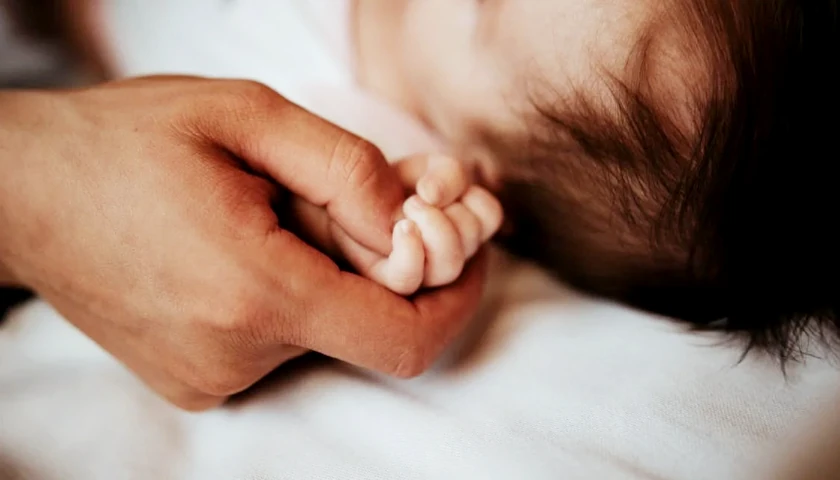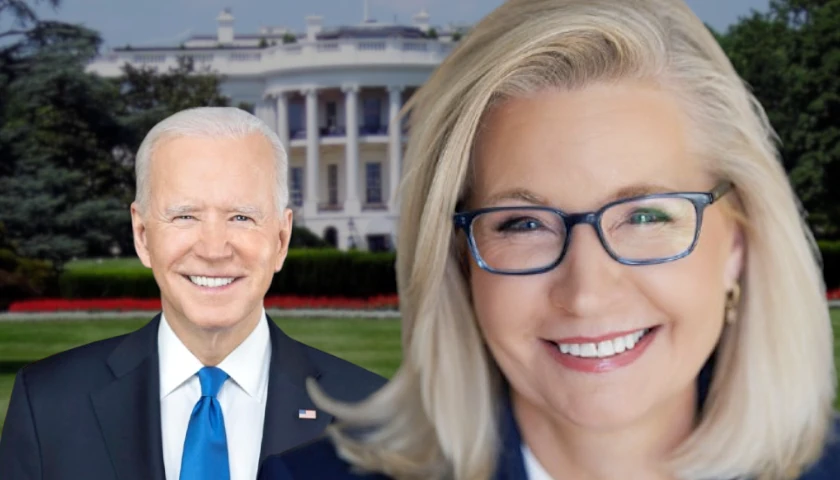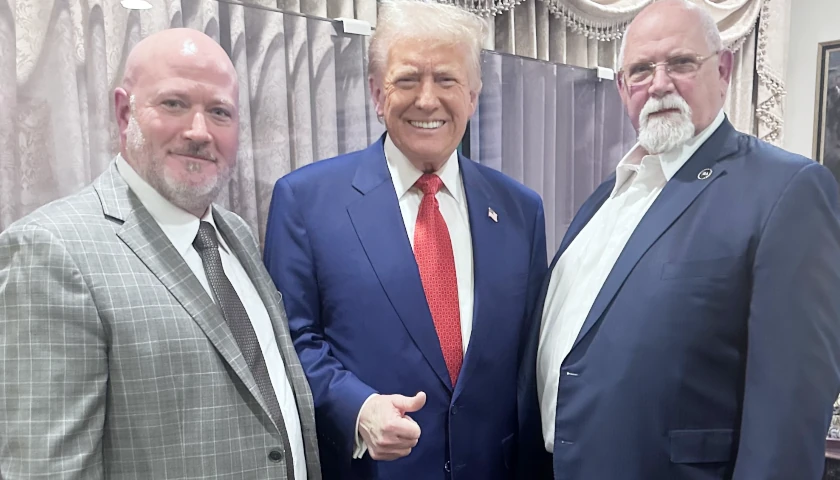by Julie Kelly
Jury selection begins in a Grand Rapids courtroom Tuesday morning in the federal trial of four men accused of conspiring to kidnap Michigan Governor Gretchen Whitmer in 2020.
The long-awaited trial centers on the question of whether a loose band of misfits angry at pandemic lockdowns hatched a sinister plot to abduct Whitmer from her vacation cottage and possibly kill her—or if the foiled caper was yet another successful attempt by the Federal Bureau of Investigation to interfere in a election and sabotage Donald Trump’s presidential campaign.
Timing of the trial could not be worse for the scandal-plagued agency quickly losing the trust of the American people. Top FBI officials refuse to account for its role in the events of January 6, 2021, raising concerns even among some in Congress that FBI assets acted improperly before and during that day. The first trials of January 6 defendants start this month but the Justice Department has yet to make hundreds of thousands of FBI files available to defense attorneys.
Further, Special Counsel John Durham continues his slow drip of evidence revealing how Democratic Party operatives used the FBI to sanitize political propaganda before the 2016 election.
To that end, the Whitmer trial will expose just what the FBI is capable of and willing to do to help Democrats score political points at the most opportune moments. At least 12 FBI informants and undercover agents participated in the “kidnapping” scheme, which created damaging national headlines for Trump as early voting was underway in swing states including Michigan. Authorities arrested several men on October 7, 2020 and charged six with federal kidnapping charges. (Two men have pleaded guilty and will testify for the government.)
The kidnappers—alleged members of right-wing militia groups—took their cues from Trump, Whitmer and Joe Biden immediately claimed. Biden accused Trump of sending “dog whistles” that motivated the would-be kidnappers to act against one of the president’s most public political foes. “When our leaders meet with, encourage, and or fraternize with domestic terrorists, they legitimize their actions. They are complicit,” Whitmer said in an overwrought video statement, referring to Trump.
But the defense has since built a strong case of FBI entrapment. An August 2021 motion filed by one defense attorney detailed how “the government’s agents actively planned and coordinated its efforts to induce the defendants to engage in incriminating behavior and statements, even going so far as designing the objective and structural components of the conspiracy alleged in the indictment.”
Agents and informants “focused on a band of individuals with unstable personal histories—and injected into the mix the kind of father-figure, military-hero role models the men craved in their lives.” This included Adam Fox—the purported leader of the gang whom one co-conspirator called “Captain Autism”—an intermittently employed man living at the time with his two dogs in the dilapidated cellar of a vacuum repair shop located in a Grand Rapids strip mall. But Fox made a new friend in 2020 as he struggled to put his life together amid a clear addiction to marijuana, a man he knew as “Dan.”
Hired by the FBI in early 2020 as a confidential human source under the agency’s wide-ranging operation to infiltrate suspected militia groups, “Dan” quickly latched on to Fox. For six months’ work as an informant, “Dan” was paid at least $50,000 by the FBI.
Until “Dan” and several FBI assets became intricately involved, nearly all of the activity among the defendants was online bravado—that changed when Fox and others attended a “National Militia” conference in Ohio in June 2020. The meeting wasn’t organized by the defendants but rather by Stephen Robeson, a self-described militia leader from Wisconsin.
Robeson, however, wasn’t a militiaman or a like-minded political agitator. The convicted felon was a longtime FBI informant working with “Dan” to lure the defendants into the Whitmer kidnapping trap. Robeson, described as “CHS-2,” was responsible for numerous excursions—trips paid for by the FBI the indigent defendants otherwise could not have attended—that allowed authorities to collect hundreds of hours of evidence against the defendants. Another informant, known as “Jenny,” also played an instrumental role.
“Collectively, the first three informants were directly involved in every aspect of this case, every meeting, every [field training exercise] and every significant event from the day the investigation commenced in March of 2020 until the Defendant’s arrests [sic] on October 7, 2020,” Christopher Gibbons, Fox’s attorney, wrote in a motion filed last week. “CHS Dan had contact of some kind with Adam Fox every day, sometimes dozens of text messages a day. CHS Steve and CHS Jenny were the genesis of the fictional ‘National Patriot III% Militia’ that Adam Fox joined, and his ‘membership’ in this group is now the basis for the Government’s allegation that his conduct is ‘domestic terrorism.’”
Despite their allegedly heroic undercover work to thwart the so-called terror attack, neither “CHS Steve” nor “CHS Jenny” will take the witness stand for the prosecution during the trial. (The government plans to call “CHS Dan.”) Prosecutors now accuse Robeson of acting as a “double agent” who committed at least two other crimes while working as an informant.
It’s unclear why the Justice Department won’t call “CHS Jenny” to testify—further, the government objected to a request by the defense to make public all payments and reimbursements made to both informants by the FBI. How they were compensated, defense attorneys argued, would speak to their “motivation” and whether payment was contingent on inducing certain outcomes by the defendants. (A judge denied the defense motion for now, ruling the request could be reconsidered if “Steve” and “Jenny” were called as witnesses for the defense, which is likely.)
The Justice Department also fought to conceal from jurors the identities of two undercover FBI agents known as “Mark” and “Red,” asking the judge to allow the agents to use pseudonyms in court because both men “are currently involved in undercover antiterrorism investigations unrelated to this case.” Prosecutors even went as far as to request that the courtroom artist be prevented from sketching their images for the public—fueling speculation that either or both men are involved in the Justice Department’s largest antiterrorism investigation, the four-hour protest on January 6, 2021.
Judge Robert Jonker, the district court judge overseeing the trial, rejected the government’s request: “It is time for all guise and pretense to end and for the prosecution to present the evidence in an open forum with witnesses testifying using their true identity,” Jonker ruled last week.
The prosecution’s witness list also omits the top three FBI officials in charge of the investigation. Richard Trask, the special agent in the FBI Detroit field office who signed the initial criminal complaint, not only was removed from the case last year but fired by the department following his arrest for assaulting his wife in a drunken rage after a swingers’ party near their home. Local reporters also discovered anti-Trump posts on Trask’s social media account.
Jayson Chambers and Henrik Impola, the FBI agents who handled the informants, also won’t testify amid scandal: Chambers is accused of running a security firm on the side and using his FBI cred to promote it, and Impola is accused of committing perjury in a separate case.
The defense has signaled they might call all three to testify.
Two men initially charged in the kidnapping case, Ty Garbin and Kaleb Franks, are scheduled to take the witness stand for the prosecution. Garbin pleaded guilty early in the prosecution; Franks, whose lawyer produced some of the most damning evidence of entrapment, finally pleaded guilty last month after the government suggested it would pursue more charges against him.
Prosecutors also forced a confession of sorts out of Franks in his plea arrangement. “The defendant became aware after his arrest that several individuals whom he believed to be fellow conspirators were actually undercover informants or agents,” assistant U.S. Attorney Nils Kessler wrote in the government’s plea agreement. “The defendant knows [his co-defendants] were not entrapped, based on personal observation and discussions. During all their months of training together, the defendant never heard [his co-defendants] say they were doing anything because CHS Dan, CHS Steve, or any other informant had advocated it.”
That, of course, will be for a jury to decide now. It undoubtedly is an uphill climb for the defense. But over the next several weeks, it’s apparent that the FBI will be on trial just as much, if not more, than the four men who stand accused.
– – –
Julie Kelly is a political commentator and senior contributor to American Greatness. She is the author of January 6: How Democrats Used the Capitol Protest to Launch a War on Terror Against the Political Right and Disloyal Opposition: How the NeverTrump Right Tried―And Failed―To Take Down the President. Her past work can be found at The Federalist and National Review. She also has been featured in the Wall Street Journal, The Hill, Chicago Tribune, Forbes, and Genetic Literacy Project. She is the co-host of the “Happy Hour Podcast with Julie and Liz.” She is a graduate of Eastern Illinois University and lives in suburban Chicago with her husband and two daughters.
Photo “Gov. Gretchen Whitmer” by Office of the Governor, State of Michigan CC BY-SA 3.0.




